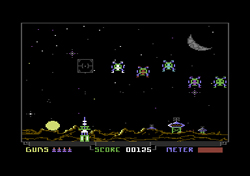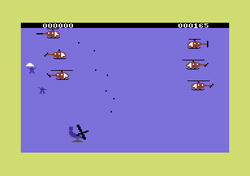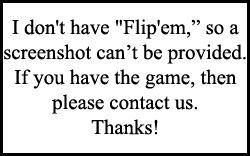Public-Domain Commodore 64 Games
by Chris Federico
The public domain is our only hope at the moment. Programmers write original games that they share with others for free; it sounds simple, and even inevitable, as not every artistic thing is created for a buck. But in the public domain lie the remnants of the all-but-extinct idea of the truly innovative game.
Throughout the '80s, public-domain games seemed little more than neat extras, with ten pieces of garbage for every gem, as in most commercial catalogues -- but the difference has always been that PD games are free. Even shareware remains incredibly inexpensive when compared with a thirty-to-sixty-dollar game that you might not even like when you get it home.
8-bit PD programs were available on traded floppy disks (they'd just happen to be there when your friend lent you his "archives" of copied games), and they were always present on BBSs and, of course, CompuServe, the '80s online service of choice. The pre-Internet was text only, with XModem uploads and downloads. A slow but sure manner in which to send or receive files, XModem was simply a primitive data-transfer protocol for trading homemade programs, and it usually came along with your terminal program.
Following are brief descriptions of a few Commodore 64 PD games. These are my opinions only; if you have something to say, or a program you've written, send it! (What a great way to get free software. Heh heh.)
Learning how to program the Commodore 64 was never the hard part. For being such an early machine, it was extremely friendly. When you turned it on, BASIC was immediately available. Maybe you went out and bought a book and assembler, and you learned how to write machine-language programs. Learning wasn't the hard part. It was easier than, say, calculus. But taking advantage of that computer -- getting the most out of it and exploiting its features -- that took memory management, coding efficiency, and countless tricks and magazine-gleaned techniques. So I consider the games below to be achievements, and I thank the programmers for sharing their work .
None of the following titles provide life-changing experiences, but that's not the point. These are all more entertaining than quite a lot of commercial games, and for entirely homemade chunks of code, they're impressive as hell. They do the job of offering substantial enjoyment, and they're all...well, you know how you can say that there's "just something about" certain games? Okay. Here we go.
- Roofus by Jim Roof (of the self-styled Oofray Software)
This originally went by the title of Omicron -- until Compute!'s Gazette published the code of an identically named program that was actually an Omega Race rip-off. This one isn't. It looks beautiful, first of all. Your cannon slides along the ground, Space Invaders-style, and it's drawn in exquisite detail. It looks like one of the smaller Death Star gun towers. A row of five aliens zooms by overhead, roller-coastering in tricky patterns. If you only shoot, say, three or four before the group careens off-screen, it comes back, the missing aliens having been replaced with little Outlines of the Dead (as I call them). If you clear out the whole group, you get a new one. The aliens are drawn impeccably, and the backdrop is this painting-quality moonscape with vivid colors that jump right out at you.
The speed and smoothness of the attacks and player control are uncanny. This guy really knew his game design. None of the player's lightning-fast shots ever go through aliens due to collision-detection errors; there's no break in the fluidity. It's still only a shoot-'em-upward game, but it might well be the best I've played on any 8-bit computer. You can choose your speed, and the fastest is really fast. You can't master this game easily, but it's easy to learn. (Hey! Isn't that one of Adam's rules?)
I downloaded the game from CompuServe in 1984 or '85 -- from the Commodore SIG (Special Interest Group), in fact. It was great to browse through descriptions, find an interesting-sounding game, spend an hour waiting for it to download through the VICModem and onto your floppy (okay; maybe that wasn't one of the great parts), and then actually discover once in a blue moon that it was worth the small effort.
- Snipe Shooter by ???
This went by at least one other title (Shooter, for instance -- which, in spite of being as simple as one can possibly get, makes more sense, as sniping isn't involved in the game play), until Rabbit Software snatched it up in 1983 and released it commercially as Paratroopers. You control a giant who sits in what appears to be a desk chair with a machine gun mounted onto it. You can fire many, many bullets at once, and they fly into the air like clouds of insects, obliterating choppers and parachuting men. There are options galore -- stationary or moveable chair, easy or hard difficulty, guided shots (have you ever guided a whole cloud of bullets? It's awesome), and more. The graphics are well done and the collision detection is perfect, and it's hilarious when enough paratroopers land on the ground near your gun to overthrow you; they march off the screen, quickly build a huge tank, and come back to reduce your giant to a pile of black ash.
- Flip 'Em by ???
The graphics here are simple -- in fact, they consist entirely of a grid of periods and numbers, onto which are plotted Xs and Os. This is, as far as I'm concerned, the best version of Othello available for the C64. It's challenging but beatable, and it offers two difficulty settings. It actually tends to be addictive -- very rare for an electronic board game. It's very fast for BASIC (thanks to the programmer's usage of the old Blitz! compiler), and doesn't try to impress with extraneous extras.
I could not find Flip 'Em after searching the Internet. I have so little information to go on about this game that it makes it difficult to find. It certainly is not the better-looking Flip'em by Jon Perregaux that was released in 1986. If you can provide more information, or have the game (or are even the author?), then contact me.


